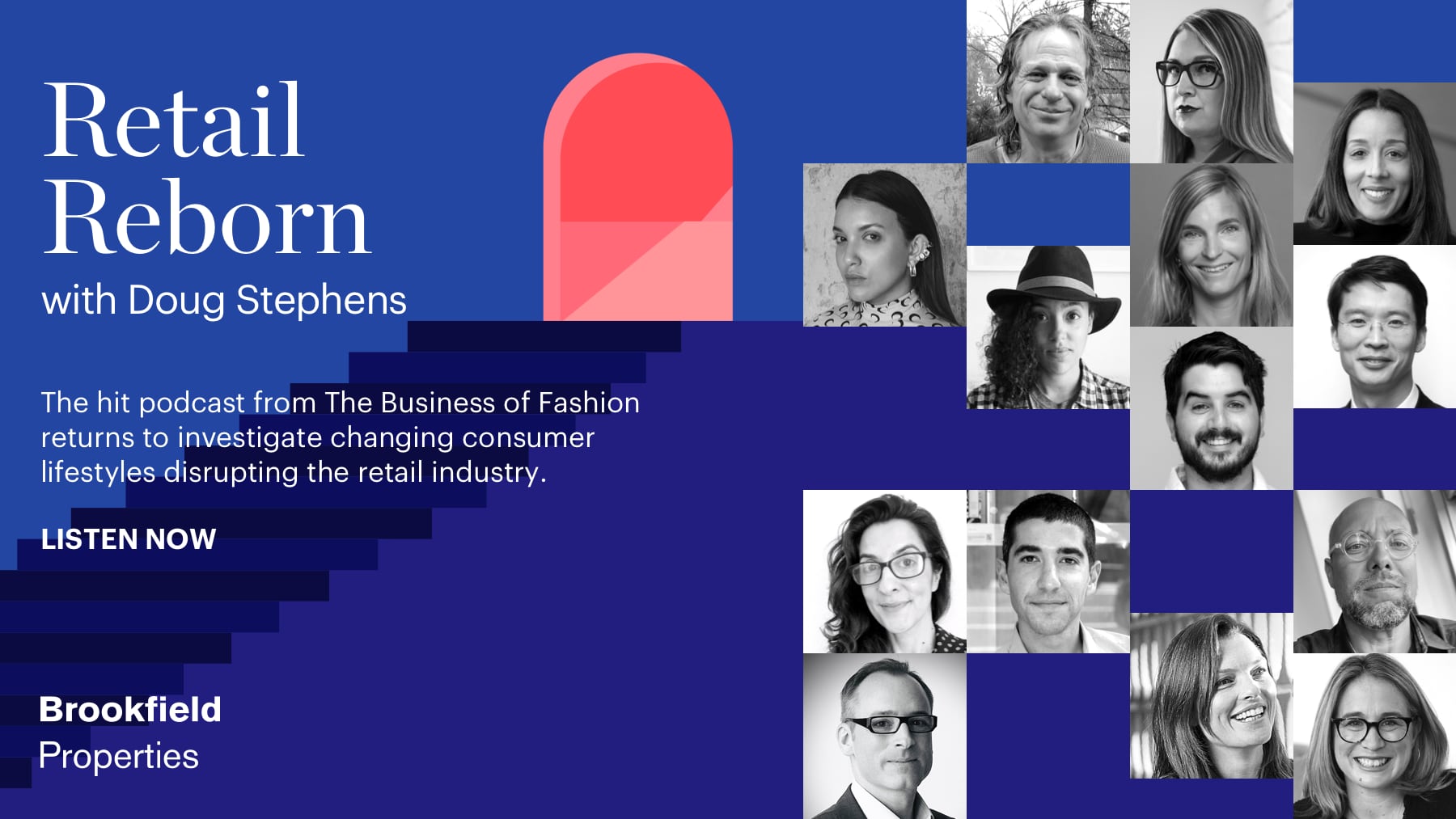Retail Reborn Season 2: The Consumer of Tomorrow
Follow the series to ensure you never miss an episode.
BoF’s podcast series Retail Reborn returns for a second season, presented by Brookfield Properties, to investigate the consumer of tomorrow, and how their changing lifestyles and expectations will drive evolution in the retail industry.
Podcast host and founder of the Retail Prophet Doug Stephens returns this season, and is joined by 14 global authorities, including industry thought-leaders, fashion and retail executives, and academic experts, sharing their insight and analysis on the next-generation consumer. Guests will discuss generational expectations as shaped by the pandemic, climate crises and economic downturns, as well as examining where, how and what next-gen consumers will buy.
Guests range from futurists such as “Godmother of the Metaverse” Cathy Hackl to luxury and sporting goods analyst and author Erwan Rambourg; academics including adjunct professor in global digital economy Winston Ma and social psychologist and season one returning guest Sheldon Solomon; as well as fashion and retail leaders, from Chloé’s chief sustainability officer Aude Vergne to Depop’s global head of sustainability Justine Porterie and SVP of retail at Warby Parker Sandy Gilsenan.
Episode 1: We address the redrawing of city life as we examine the new lifestyle patterns that have propelled a seismic shift in urban centres not seen since the industrial revolution, before illuminating the growing importance of the metaverse in retail and the shifting nature of a physical store’s purpose.
Episode 2: We explore the global forces redefining financial circumstances of future consumers, from economic to climate crises, and how these in turn will impact consumption habits and centres of wealth to transform retail.
Episode 3: We consider how consumers will shop and highlights innovative paths to purchase, from bartering economies to crypto-currencies.
Episode 4: The series concludes on the pandemic’s impact on consumer behaviour, the growing demand for and urgency of sustainable goods, and the evolving attitude towards ownership in what consumers will buy.
To discover how retail’s consumer of tomorrow will impact your business and learn critical, actionable insights into the challenges and opportunities retail’s new ecosystem will bring, follow the series to ensure you never miss an episode.
Retail Reborn: Expert Commentators
Thomas J. Campanella is associate professor of urban studies and city planning at Cornell University and historian-in-residence of the New York City Parks Department. He is also the author of Republic of Shade: New England and American Elm, and The Concrete Dragon: China’s Urban Revolution and What it Means for the World. His writing has appeared in The New York Times and Wall Street Journal.
“Cities are remarkably efficient machines for human civilisation. The greenest place, arguably in North America, is not some pious little town in Vermont… It’s Manhattan, the densest part of New York City.”
Cathy Hackl is founder and CEO of metaverse consultancy, Futures Intelligence Group. Since its launch in 2020, the consultancy has advised brands on growth strategies, NFTs, gaming and virtual fashion. Dubbed the “Godmother of the Metaverse”, Hackl is author of The Metaverse Economy, host of Future of the Metaverse podcast, and was voted BigThink’s top 10 most influential women in tech in 2020.
“The Metaverse is enabled by many different technologies. […] If I have a wearable glasses that I’m wearing in front of my face and I can augment what people see and I can augment what people hear, that gives retail a different opportunity. Sometimes we will want to go to the store, but it will be a lot more experiential.”
Sonny Gindi and Eden Melloul are co-founders of the Stôur Group, a business that partners with digital publishers and influencers to bring aspects of online shopping to the physical retail experience. Stôur is behind The Allure Store, curated by the Condé Nast magazine’s editors. Gindi acts as creative director and Melloul as chief brand officer of Stôur.
“Retailers have to stop thinking that brands are vendors. Retailers have to start thinking that brands are their clients and that they are here to service them,” says Gindi.
“The whole world is saying retail is dead. And if that’s true, then who killed it? Well, if the internet killed it, then what’s true about the internet? What’s true about the internet is content. […] We create a bunch of bespoke content around your product. Effectively, it’s a marketing suite of services inside of a physical retail environment,” continues Melloul.
Tracy Francis is the head of consumer packaged goods and retail practises in Central and South America at McKinsey & Company. Based in the São Paulo offices, Francis is the author of the McKinsey report, ‘True Gen’: Generation Z and its implications for companies. Its one of the most viewed articles on McKinsey.com in the past two years, with over 1.5 million views. Francis previously founded and led the company’s Latin American healthcare practice.
“With Gen-Z, the first lever they pull on [is] sustainability. […] The second lever they pull is, do I need it first hand or can I exchange with a friend? Or should I go to this secondhand website and put it for sale and get something else in return?”
Erwan Rambourg is a luxury and sporting goods analyst and author of The Bling Dynasty: Why The Reign of Chinese Luxury Shoppers Has Only Just Begun, and Future Luxe: What’s Ahead for the Business of Luxury. A former marketing manager at LVMH and Richemont in the early 2000s, Rambourg is a regular contributor to the Wall Street Journal, Financial Times, CNBC and Bloomberg.
“The future is really about mainland China and, to a certain extent, the up-and-coming American consumer. You have to take into account values that might be different. Typically, if you’re looking at a European consumer, she has been exposed for ages to these goods and she probably lives in a country […] where you’ve had an aristocratic history. In the US, it’s completely different.”
Sandy Gilsenan is senior vice president of retail at Warby Parker, which she joined in 2018. Gilsenan oversees all retail operations as well as the expansion of vision services. Prior to Warby Parker, Gilsenan was the senior vice president of North America for Sweaty Betty and spent 14 years at J.Crew as vice president of store operations.
“It’s painful to come to a retail store. It can be inconvenient, except for those people that really like to shop. So we really consider what customer feedback does to help us to make critical decisions around our brick-and-mortar business.”
Winston Ma, CFA & Esq., is an investor, attorney and adjunct professor in the global digital economy. Ma was managing director and head of North America for the China Investment Corporation, and held positions as the deputy head of equity capital markets at Barclays Capital, and vice president at J.P. Morgan. He is author of China’s Mobile Economy, The Hunt for Unicorns: How Sovereign Funds Are Reshaping Investment in the Digital Economy, and The Digital War: How China’s Tech Power Shapes the Future of AI, Blockchain and Cyberspace.
“Data is valuable. […] And at the same time, [consumers] also recognise data is dangerous. […] So I think there’s a global push not only from the government side, but also from the users side, to limit the usage of biometric payment out of legitimate privacy concerns.”
Marjorie Hernandez de Vogelsteller is a design and innovation expert and co-founder of LUKSO — a blockchain infrastructure that provides a series of standards and solutions for physical and digital consumer goods.
“Pretty much everything that you can do in bitcoin is just transact with bitcoins. […] You can potentially put a message in the transaction, but that’s pretty much it. […] We go from just being able to transact like we do in Bitcoin to being able to to create business logic and to build different kinds of applications and implementations that are more complex than just transactions within the Ethereum ecosystem.”
Gina Bibby is a partner at Withersworldwide, leading the law firm’s global fashion tech practice. Bibby advises fashion tech clients on corporate formation, venture capital, corporate transactions, real estate, privacy, e-commerce and intellectual property. In recognition of her innovative fashion tech practice, The American Lawyer named Bibby a “2021 Trailblazer”.
“You have a segment of the population that has been historically discriminated against by financial institutions. So, then what you have with the Blockchain is you remove all of those barriers to entry because I can be an individual with no credit history and no credit card, and I can still transact with brands and retailers online.”
Sheldon Solomon, a returning guest from season one of Retail Reborn, is a social psychologist and professor of psychology at Skidmore University. Solomon developed the terror management theory, along with Jeff Greenberg and Tom Pyszczynski. He is also co-author of In the Wake of 9/11: The Psychology of Terror, and The Worm at the Core: On the Role of Death in Life.
“Millennials have been kicked in the psychological groin in extraordinary ways. And moreover, they’re in an excruciating position, because they’re the first generation who didn’t do better than their parents, but nobody told their parents, so they were squeezed in a world of diminishing opportunity and rising expectations.”
Justine Porterie is the global head of sustainability at Depop, where she leads their efforts in helping to make fashion more circular. Having started her career in consulting, Porterie specialises in responsible investment, ESG impact and sustainability strategy.
“Buying second-hand or making-second hand gifts […] was a total taboo. Whereas now, especially with Depop and the young generation, […] it has a powerful aura to it and social credit that comes with it because it means uniqueness and because it means you go out of your way to express yourself.”
Michaela Larosse is head of content and strategy at digital fashion house The Fabricant. Larosse has worked with brands such as the BBC, Nike and Visa, and is dedicated to advancing the transition to a circular economy and advocating on behalf of brands and initiatives that actively contribute to a more sustainable future.
“It’s a way of iterating your identity in virtual spaces. […] Going to a digital concert in a virtual world, maybe that’s where you let your digital fashion imagination run wild and you wear a garment that’s physically impossible in the real world. The creative palette with digital fashion is as big as your imagination because there are no physical boundaries to creation.”
Aude Vegne is chief sustainability officer at luxury fashion brand Chloé, which recently acquired B-Corp status. Vergne is also a member of the strategic committee and licences director at the brand. Prior to her current role, Vergne worked for 15 years in the beauty industry holding several management positions for Unilever and Shiseido. She worked on Jean Paul Gaultier and Elie Saab lines, and launched Alaïa into perfume.
“If you look at the fashion industry overall, I think the first question is for me about changing habits. You can buy one item, which is a slightly higher price and lower impact attributes. Instead of 10, you can buy second hand, you can swap. So today, the younger generation has much more options to move to a circular model and to buy less.”
Follow the series to ensure you never miss an episode and discover actionable insights into the opportunities and challenges the consumer of tomorrow will bring and how retail’s transformation will impact your business.



